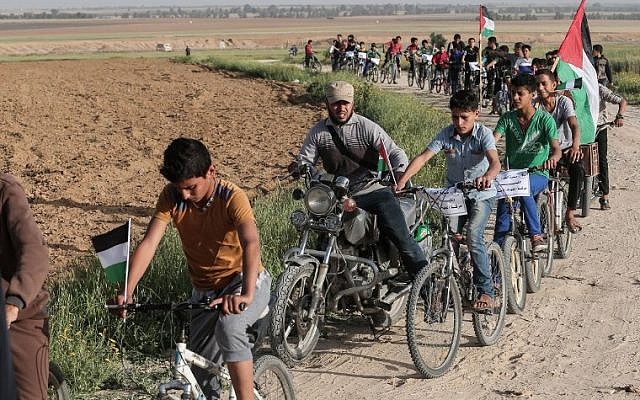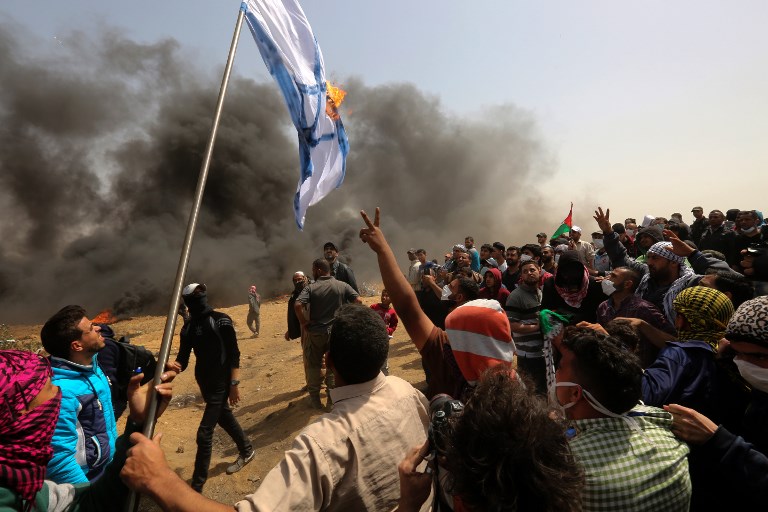 |
| Palestinian children ride bikes near the border with Israel on the outskirts of Khan Yunis in the southern Gaza Strip, as they take part in a cycling race demanding a 'Right of Return' for millions to Israel on March 26, 2018. (AFP/Said Khatib) |
The encampments set up in the Gaza Strip as part of the so-called March of Return protest will be moved 50 meters closer to the border with Israel, the organizers of the mass demonstrations announced on Wednesday.
The National Forum for the March of Return, one of several Palestinian groups behind the weekly demonstrations, said that the decision came to “affirm our right to return” — a reference to the Palestinian demand that Israel allow tens of thousands of refugees and their millions of descendants to return to their former homes inside Israel, a demand that would mean the end of Israel as a majority Jewish state.
The decision also came in the context of the Palestinians’ effort to thwart US President Donald Trump’s yet-to-be-announced peace plan and end the Israeli blockade on the Gaza Strip. (Israel says it maintains the blockade to prevent Gaza’s terrorist ruler Hamas, which seeks to destroy it, from importing weaponry.)
(AFP/Said Khatib)
The encampments set up in the Gaza Strip as part of the so-called March of Return protest will be moved 50 meters closer to the border with Israel, the organizers of the mass demonstrations announced on Wednesday.
The National Forum for the March of Return, one of several Palestinian groups behind the weekly demonstrations, said that the decision came to “affirm our right to return” — a reference to the Palestinian demand that Israel allow tens of thousands of refugees and their millions of descendants to return to their former homes inside Israel, a demand that would mean the end of Israel as a majority Jewish state.
The decision also came in the context of the Palestinians’ effort to thwart US President Donald Trump’s yet-to-be-announced peace plan and end the Israeli blockade on the Gaza Strip. (Israel says it maintains the blockade to prevent Gaza’s terrorist ruler Hamas, which seeks to destroy it, from importing weaponry.)
Egypt has reportedly been exerting pressure on Hamas and other Palestinian groups to halt the mass protests. The Egyptians, according to reports, have expressed fear that the demonstrations could spin out of control and ignite another war between Hamas and Israel.
 |
| Palestinian protesters burn an Israeli flag during clashes with Israeli forces near the border with Israel, east of Gaza city in the central Gaza strip, on April 13, 2018. (AFP/Mahmud Hams) |
A senior Hamas delegation headed by Saleh Arouri and Musa Abu Marzouk arrived in Cairo on Tuesday for talks with Egyptian intelligence officials on the weekly demonstrations, reconciliation between the terror group and the ruling Fatah faction headed by Mahmoud Abbas, and a possible prisoner exchange between Hamas and Israel.
According to the Hamas-run health ministry in the Gaza Strip, 35 Palestinians have been killed by Israeli gunfire since the beginning of the March of Return three weeks ago. Hamas has acknowledged that several of those killed were its members, and Israel has identified other fatalities as members of terrorist groups.
On Friday, at least 10,000 Gazans took part in large-scale demonstrations, with the Israeli military saying some protesters hurled an explosive device and firebombs at Israeli troops deployed at the border, as well as making “several attempts” to damage the fence and cross over into Israeli territory. A week earlier, about 20,000 Palestinians took part in the demonstrations, with the previous week attracting an estimated 30,000.
Ahmed Abu Rtaimeh, member of the National Forum for the March of Return, said on Wednesday that the demonstrations would continue “with full force” in the coming weeks.
He told the Hamas-affiliated Al Resalah news website that the March of Return had “imposed a new struggling reality that has vitalized the Palestinians and redefined the Palestinian cause as a cause of a people who want to return to their country.”
In a related development, Hamas said on Wednesday that it has resumed payments to Palestinians injured during the events near the border with Israel. According to Hamas, some 350 injured Palestinians have received a total of $75,000 in the past few days. It said the payments came as an expression of thanks to those who risked their lives during the demonstrations.
Hamas said that the financial aid was in the context of its responsibility toward the Palestinians “in spite of the financial crisis it is suffering from and in light of the Palestinian Authority government’s failure to assume its responsibilities towards the residents of the Gaza Strip.”






No comments:
Post a Comment
We value your response, Give your comments here